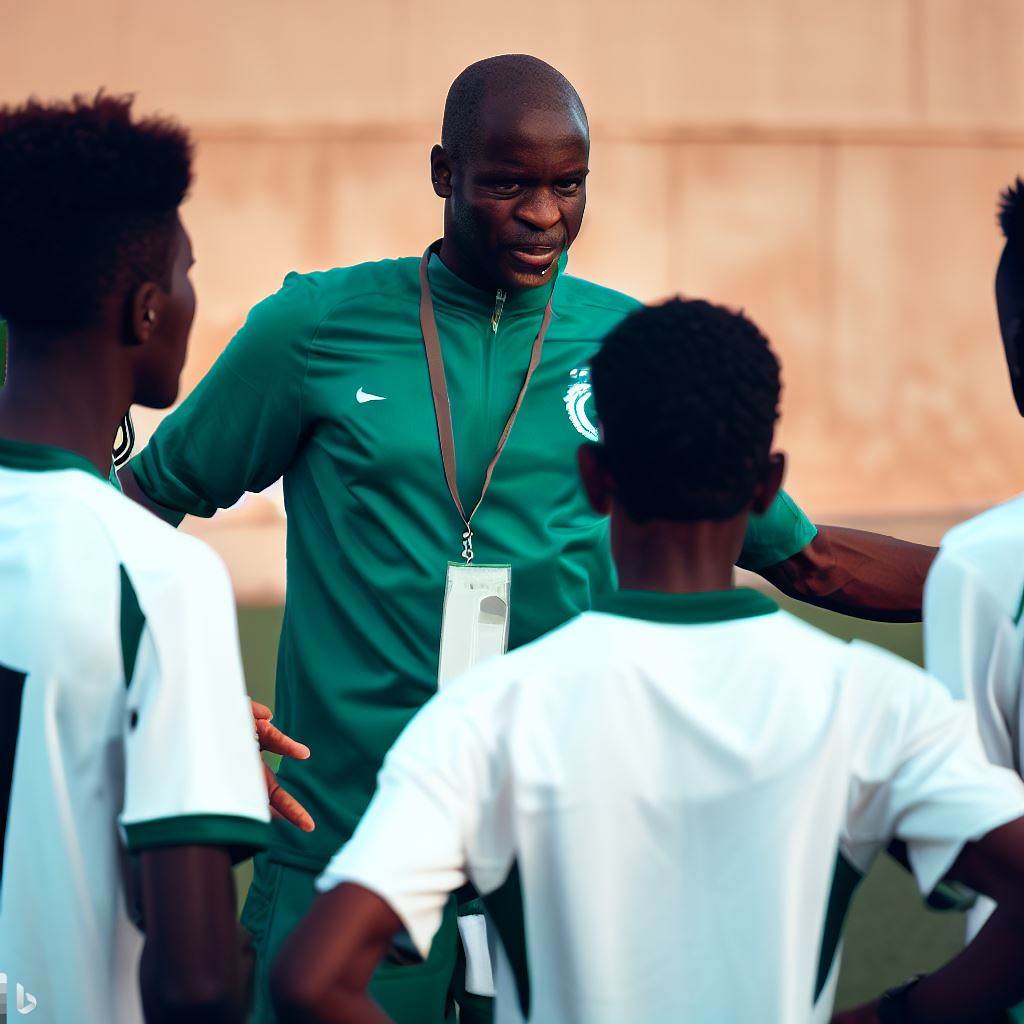Introduction
Assistant coaches play a crucial role in the development and success of sports teams in Nigeria.
They are responsible for assisting the head coach in various aspects, including training, game strategies, and player development.
A. Role of assistant coaches in Nigeria
Assistant coaches in Nigeria provide support to the head coach by assisting in planning and conducting training sessions, analyzing opponents, and developing game strategies.
They also help in evaluating and selecting players for the team, as well as providing guidance and support to athletes.
B. Importance of having the necessary skills for this position
Having the necessary skills is essential for assistant coaches in Nigeria as it allows them to effectively contribute to the team’s success.
Skills such as strong communication, leadership, and technical knowledge are vital in order to effectively assist the head coach in training and guiding athletes.
Additionally, assistant coaches need to have excellent teamwork and organizational skills to maintain a well-structured and disciplined team environment.
Basically, assistant coaches have a crucial role in Nigerian sports teams and need to possess the necessary skills to support the head coach and contribute to the team’s success.
Their role involves various responsibilities, including training, analyzing opponents, player development, and team management.
By having the right skills, assistant coaches greatly enhance their effectiveness and positively influence the team’s performance.
Communication skills
- Effective communication enhances understanding and promotes team unity.
- Assistant coaches must convey strategies and instructions clearly to ensure players execute them accurately.
- Clear communication fosters mutual trust and strong player-coach relationships.
- During team meetings, coaches must effectively communicate game plans, objectives, and expectations.
- In training sessions, assistant coaches should use concise and specific instructions to guide players.
- On the field, effective communication enables coaches to provide real-time feedback and make necessary adjustments.
- During matches, assistant coaches must effectively communicate substitutions, tactical changes, and time management strategies.
- Assistant coaches should provide constructive criticism to players in a respectful and tactful manner.
- Effective communication builds player confidence and motivates them to improve.
- Assistant coaches must communicate well with the head coach to align coaching methods and strategies.
- Coordination between coaches creates a cohesive and successful coaching staff.
- Assistant coaches should effectively communicate players’ roles and responsibilities to prevent confusion during games.
- In high-pressure situations, clear communication helps assistant coaches stay composed and make rational decisions.
- Clear communication minimizes errors and maximizes efficiency in team operations.
- Assistant coaches should lead by example and demonstrate effective communication skills to inspire players.
In addition, effective communication is crucial for assistant coaches in Nigeria. It enhances understanding, promotes team unity, and improves performance.
Communication plays a vital role in conveying strategies, delivering instructions clearly, and ensuring players execute them accurately.
By actively listening, providing constructive feedback, and maintaining open lines of communication, assistant coaches can foster strong player-coach relationships and contribute to the overall success of the team.
Read: Assistant Coach: A Key to Nigerian Basketball Rise
Leadership abilities
Leadership abilities are crucial for assistant coaches in Nigeria as they play a vital role in leading the team.
Transform Your Career in Nigeria
Discover unmatched expertise with our personalized Career Consulting service. Navigate Nigeria’s job market with a strategy tailored just for you.
Get StartedA. Importance of Demonstrating Leadership Qualities
Assistant coaches must demonstrate strong leadership qualities to effectively manage and guide the team.
Leadership helps in setting a positive and inspiring example for the players, creating a cohesive and motivated team.
When assistant coaches display leadership qualities, it enhances the overall performance and success of the team.
B. Motivating and Inspiring Players through Leadership
Assistant coaches can motivate and inspire players by fostering a positive and encouraging environment.
They should communicate effectively, provide constructive feedback, and instill confidence in the players.
By setting goals, assistant coaches can motivate players to strive for excellence and constantly improve.
C. Examples of Beneficial Leadership Traits
- Strong Communication Skills: Assistant coaches should be able to articulate their thoughts and instructions clearly.
- Emotional Intelligence: Understanding players’ emotions and providing support and motivation accordingly.
- Adaptability: Being flexible and adaptable to changing situations and individual player needs.
- Trustworthiness: Establishing trust and credibility among players, ensuring open and honest communication.
- Confidence: Assistant coaches must exhibit confidence to inspire belief and trust in the team.
- Accountability: Taking responsibility for their actions, decisions, and the overall team performance.
- Problem-Solving Skills: Assisting players in overcoming challenges and finding solutions.
- Positive Attitude: Maintaining a positive mindset even during tough times and motivating players.
- Respect: Assistant coaches should treat players, fellow coaches, and officials with respect.
- Empathy: Understanding and empathizing with players’ needs, concerns, and challenges.
These leadership traits enable assistant coaches to create a healthy, productive, and positive team culture.
Moreover, assistant coaches should encourage players to develop their own leadership skills.
By empowering players, assistant coaches help them take ownership and responsibility for their performance.
Assistant coaches should provide opportunities for players to lead and contribute actively to the team’s success.
In general, leadership abilities are of utmost importance for assistant coaches in Nigeria.
Through their leadership, assistant coaches can motivate, inspire, and guide players to achieve their full potential.
By exemplifying strong leadership traits, assistant coaches contribute to the success of the team and create a positive team culture.
Read: Networking in Nigeria: Assistant Athletic Trainer Tips
Knowledge of the Sport
Assistant coaches in Nigeria must possess a profound understanding of their sport, going beyond basic rules and encompassing techniques and strategies.
This knowledge enables them to offer insightful guidance, analyze game situations, and enhance performance.
In football, they can devise tactics to exploit opponents’ defenses and create scoring opportunities.
Moreover, these coaches, with their expertise, become invaluable team assets.
They make informed decisions during practices and games, adjusting game plans, making substitutions, and providing effective feedback.
Their deep knowledge also inspires trust and respect, motivating players to constantly improve.
Additionally, staying updated with the sport’s latest developments, including rule changes, new techniques, and emerging strategies, is crucial.
This ensures adaptability to the ever-evolving nature of the game.
In summary, assistant coaches in Nigeria require extensive sport knowledge as the foundation for effective player guidance.
Their expertise serves as a vital resource, aiding in decision-making, offering insightful advice, and elevating player performance.
Publish Your Professional Profile, Business or Brand
Showcase your expertise, gain trust, and boost visibility instantly on Professions.ng.
Publish NowKey Skills required for Assistant Coaches
- Deep understanding of the sport they are coaching
- Ability to analyze game situations and identify strengths and weaknesses
- Capacity to provide specific strategies and tactics for improving performance
- Flexibility to adjust game plans and make necessary substitutions
- Stay up-to-date with the latest developments and trends in the sport
With these skills, assistant coaches in Nigeria can fulfill their role effectively and contribute significantly to the success of the team.
Read: Work-Life Balance: Assistant Athletic Trainer in Nigeria

Organizational Skills for Assistant Coaches in Nigeria
As an assistant coach in Nigeria, being well-organized is of utmost importance.
It is a skill that can greatly contribute to the overall effectiveness of your role and the success of the team.
Here are some reasons why organizational skills are vital for assistant coaches:
1. Efficient Planning of Training Sessions
- Assistant coaches need to plan training sessions meticulously to ensure that the team makes the most out of every practice.
- Being well-organized allows assistant coaches to create well-structured and progressive training programs.
- They can identify specific areas for improvement and design drills that address those needs.
- With proper planning, assistant coaches can optimize the limited time available for training.
2. Effective Management of Player Schedules
- Assistant coaches play a crucial role in managing the schedules of the players.
- Organizational skills enable them to plan and coordinate practices, matches, and other team activities.
- They can ensure that players have enough rest between demanding sessions to prevent injuries and maintain performance.
- By organizing player schedules efficiently, assistant coaches can create a conducive environment for player development.
3. Enhanced Communication and Team Coordination
- Being organized facilitates effective communication within the coaching staff and players.
- Assistant coaches can maintain clear and concise records of training plans, strategies, and individual player progress.
- They can easily access relevant information and share it with the team members whenever required.
- Organizational skills allow assistant coaches to coordinate team meetings, briefings, and discussions efficiently.
4. Improved Time Management
- Assistant coaches often have multiple responsibilities, such as analyzing opponents, scouting, and administrative tasks.
- Being well-organized helps them allocate time effectively to these different responsibilities.
- They can prioritize tasks, set realistic deadlines, and avoid procrastination.
- Assistant coaches can accomplish more in less time, leading to increased productivity and better outcomes for the team.
5. Mitigation of Stress and Pressure
- Assistant coaches operate in a high-pressure environment with tight deadlines and high expectations.
- Organizational skills can help them stay calm, composed, and focused amidst the chaos.
- They can cope with the demands of the role, manage their time effectively, and prevent burnout.
- By being well-prepared and organized, assistant coaches can handle unexpected situations and challenges confidently.
In short, organizational skills are indispensable for assistant coaches in Nigeria.
From efficient planning of training sessions to effective management of player schedules, being well-organized contributes significantly to the overall effectiveness of assistant coaches.
It enhances communication, improves time management, and mitigates stress. Emphasizing the importance of organizational skills is crucial for assistant coaches to succeed in their role and support the team’s success.
Read: How to Start: Assistant Athletic Trainer Career in Nigeria
Adaptability: A Key Skill for Assistant Coaches in Nigeria
Assistant coaches play an integral role in the success of any sports team, and one crucial trait they must possess is adaptability.
In the dynamic world of coaching, being able to adapt to different situations is essential for achieving positive outcomes.
This section explores the need for assistant coaches to be adaptable, explains why being open to change is beneficial, and provides examples of scenarios where adaptability becomes crucial in the role.
A. The Need for Adaptability
Assistant coaches in Nigeria must be adaptable because every training session and game presents unique challenges.
Each athlete possesses different strengths, weaknesses, and learning styles, making it necessary for coaches to tailor their strategies accordingly.
Additionally, external factors such as weather conditions, injuries, and unexpected circumstances can suddenly change the dynamics of a game.
Being adaptable allows assistant coaches to respond effectively to these unpredictable situations.
Being open to change is a fundamental aspect of adaptability.
Coaches must recognize that the strategies and approaches they have used in the past may not always be applicable in different situations.
By embracing change, assistant coaches can enhance their coaching methods and ultimately contribute to the team’s success.
B. The Benefits of Adaptability in Coaching
Adaptability brings numerous benefits to assistant coaches in Nigeria.
Firstly, it allows them to stay ahead of the game by quickly adjusting their strategies to counter their opponents’ tactics.
This flexibility ensures that the team remains competitive and can effectively respond to any changes in the playing field.
Secondly, adaptability enables assistant coaches to better meet the needs of individual athletes.
Each player requires unique support and guidance, and by being adaptable, coaches can tailor their coaching styles to maximize the potential of each athlete.
This personalized approach not only helps in skill development but also fosters positive relationships between coaches and athletes.
C. Crucial Scenarios Where Adaptability Becomes Essential
There are several scenarios where adaptability becomes crucial for assistant coaches in Nigeria.
One such situation is when unexpected injuries occur.
These can disrupt the team’s dynamics and force coaches to quickly adapt their strategy based on the available players.
Another crucial scenario is facing a strong opponent.
Assistant coaches must be adaptable and capable of adjusting their game plans based on the opponent’s strengths and weaknesses.
This adaptability can make a significant difference in ensuring the team’s success against formidable adversaries.
Furthermore, in high-pressure situations, assistant coaches must stay calm and composed while adapting their approach to provide the necessary guidance to athletes.
This ability to adapt under pressure helps maintain team morale and instills confidence in the players.
Being adaptable is an indispensable skill for assistant coaches in Nigeria.
The ability to adjust strategies, embrace change, and tailor coaching methods to meet individual athletes’ needs is essential.
By being adaptable, assistant coaches can navigate the challenges that come with coaching, stay competitive, and contribute to the overall success of the team.
Teamwork Abilities
Assistant coaches play a vital role, requiring strong teamwork to collaborate effectively with peers and head coaches.
Teamwork fosters a cohesive coaching environment, pivotal for success.
Key aspects include:
- Clear Communication: Assistant coaches ensure alignment through effective communication, reducing misunderstandings.
- Shared Responsibilities: They assist in game planning, scouting, and player development, enhancing overall coaching efficiency.
- Support and Collaboration: This support bolsters decision-making and problem-solving during practices and games.
- Trust Building: Through mutual respect and teamwork, trust within the coaching staff is established.
- Continuous Learning: Teamwork allows for skill exchange and improvement among coaches.
- Adaptability: Assistant coaches must adapt strategies based on feedback and team needs.
- Player Interaction: They must foster open communication and rapport with players, aiding development.
Teamwork is indispensable for Nigerian assistant coaches, enhancing collaborative efforts across the coaching staff.
Publish Your Professional Profile, Business or Brand
Showcase your expertise, gain trust, and boost visibility instantly on Professions.ng.
Publish NowConclusion
To excel as an assistant coach in Nigeria, it is crucial to possess key skills and continuously develop them.
These skills include strong communication, leadership, knowledge of the game, adaptability, and problem-solving abilities.
By honing these skills, aspiring assistant coaches can enhance their professional growth and contribute effectively to their teams.
Continuously developing these skills is of utmost significance as it enables assistant coaches to stay relevant in the dynamic and competitive world of coaching.
As the game evolves, so must the skills of coaches. By keeping up with the latest tactics, strategies, and trends, assistant coaches can adapt their coaching methodologies and provide innovative solutions.
Aspiring assistant coaches should prioritize acquiring and refining these skills to thrive in their roles.
Strong communication skills allow coaches to effectively convey their instructions and build positive relationships with players and staff.
Leadership skills are essential for providing guidance and inspiring the team to achieve their full potential.
Having an in-depth knowledge of the game is key, as it allows assistant coaches to make informed decisions and contribute strategically.
Adaptability helps coaches adjust to changing situations and handle unforeseen challenges.
Problem-solving abilities enable coaches to analyze complex scenarios and devise effective solutions.
Ultimately, by focusing on acquiring and refining these skills, aspiring assistant coaches can position themselves for success in the competitive field of coaching.
Continuous development in these areas will not only enhance their professional growth but also contribute to the overall success of their teams.




